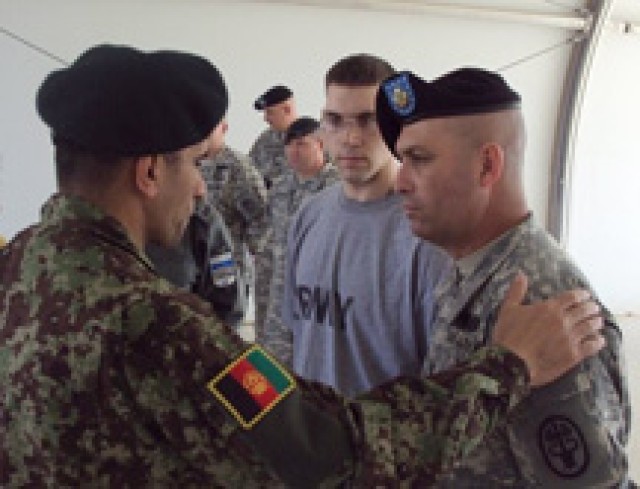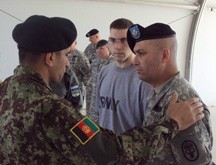FORT POLK, La. (March 19, 2010) - What began as a trip to swap training goals and ideas turned into an opportunity for the Afghanistan army's top enlisted Soldier to thank a couple of Fort Polk Soldiers for their service and sacrifice in his country.
Command Sgt. Maj. Safi Roshan, sergeant major of the Afghanistan army, along with Chief NCO Karim Khan, chief noncommissioned officer of the Afghan National Police, arrived at Fort Polk March 10 to observe training methods at the Joint Readiness Training Center and speak with local leadership on the future of Afghanistan. Part of their three-day stay included the opportunity to visit with two Soldiers wounded in Afghanistan and currently assigned to Fort Polk's Warrior Transition Battalion - Staff Sgt. Sergio Bou, wounded by an improvised explosive device, and Staff Sgt. Philip Laci, who was wounded by small arms fire.
"I saw these wounded warriors and talked to them about their sacrifice for our people," Roshan said. "One said he wanted to go back to Afghanistan. I will tell the history about these great American Soldiers, who were wounded, but want to come back and help us."
Bou was wounded in February 2007 while serving with the 3rd Brigade Combat Team, 10th Mountain Division.
"As a Soldier and leader, it's my duty and responsibility to finish the mission," Bou said. "Even though I am not deployable because of my wounds, in my heart, I want to go back and finish the fight."
Bou said it was a pleasure to meet someone from Afghanistan who was thankful for the work U.S. Soldiers are doing for that country.
"I could see in his (Roshan's) eyes that he was sincere when he spoke with me," Bou said. "He thanked me, not just for himself, but for all the people of Afghanistan. He was very emotional."
Roshan said the purpose of his visit with Fort Polk's leaders was three-fold:
Aca,!Ac To express to U.S. trainers how the Afghanistan army wants to be trained;
Aca,!Ac How the Afghanistan army wants to partner with U.S. and coalition forces; and
Aca,!Ac How U.S. forces could go about winning the hearts and minds of Afghan people.
"We were both senders and receivers on this trip," Roshan said. "We wanted to see how you train and what we could take back with us, and we also wanted to let you know what type of training we need."
Roshan was impressed with the cultural training that takes place at the JRTC.
"I saw Soldiers being taught how to treat the people of Afghanistan," Roshan said. "It's important that U.S. forces know the culture because that plays a big role in the life of an Afghanistan village."
Roshan said it's also important for the Afghanistan army and U.S. and coalition forces to work "shana-ba-shana" - or shoulder-to-shoulder.
"We have a common goal and a common enemy," he said. "To win that battle, it's important to know the Afghanistan people. In our small villages, most everyone is related, and how the elders of that village are treated is very important. If you help one member of the village, you help a lot. If you hurt one, you hurt a lot."
Roshan said he appreciated the leadership of the JRTC and Fort Polk. "This trip has been very productive for us," Roshan said. "I learned a lot."
Command Sgt. Maj. Christopher Greca, command sergeant major for JRTC and Fort Polk, said Roshan and Kahn briefed Fort Polk's senior leaders and noncommissioned officers on the direction the Afghanistan army and police are headed, and gave their keys to success on partnering while deployed. That briefing was followed by visits with the 162nd Infantry Brigade and Operations Group. Greca said the Afghan leaders had a chance to visit with cultural role players and see how U.S. Soldiers were trained in key leader and street level engagements.
"This visit validates partnership at the most senior levels of both our Armys," Greca said. "We had an opportunity to hear their thoughts in reference to partnership, and we expressed ours."
Greca echoed Roshan's "shana-ba-shana" thoughts.
"We are and will continue to work shoulder-to-shoulder, or side-by-side with each other to provide a secure environment for the people of Afghanistan," he said. "They were absolutely impressed with our strategies in regards to training and preparing our Soldiers for the culture in which they will find themselves."
Greca agreed with Roshan in his take on the importance of learning the Afghan culture.
"In their briefing to us, they stressed the importance of all Soldiers understanding the language, culture and traditions of the people of their Country," Greca said. "Sergeant Major of the Army Roshan and Chief NCO Khan thought it was so important, they delivered this message themselves. I proudly stand shoulder-to-shoulder with both these leaders"


Social Sharing